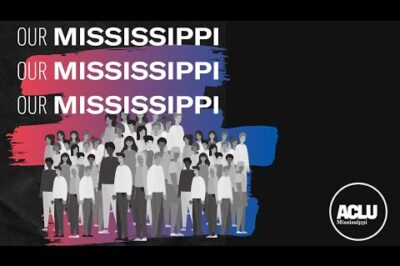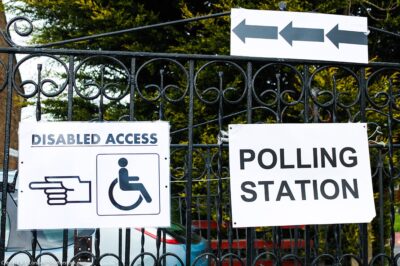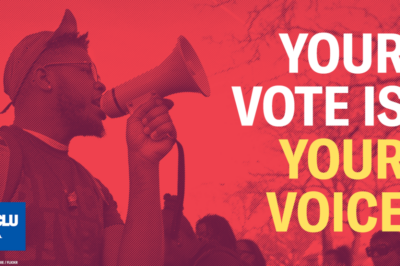ACLU Launches Voter Protection Efforts for Election Day
FOR IMMEDIATE RELEASE
Civil Liberties Group Challenges Practices That May Impact Voting Rights
NEW YORK-The American Civil Liberties Union announced today that it is prepared to respond immediately to voting rights infringements or ballot irregularities that may arise on Election Day.
“Voting is the most fundamental right we have in a democracy,” said ACLU Executive Director Anthony Romero. “All eligible voters who wish to exercise their rights on November 2 deserve to be able to cast their ballots without interference, and have confidence that their votes will be counted fairly.”
As part of its Election Day efforts, the ACLU Voting Rights Project and various ACLU state affiliates will monitor polls and respond to any incidents of voter intimidation, vote suppression or election foul-ups. Voters with complaints are encouraged to call the organization’s toll-free voter hotline, 1-877-523-2792. In coordination with state affiliates, the ACLU has distributed more than 100,000 voter empowerment cards in English and Spanish, which contain information for voters on their rights and ways to avoid problems when voting.
Some of the activities the ACLU will monitor on Election Day, include:
- Voter harassment or intimidation, including slurs or signs of bias among poll workers
- Efforts to have voters produce identification or proof of citizenship in situations where such information is not required
- Disinformation campaigns, such as posting fliers in minority neighborhoods that give false information on voting requirements
- Moving or closing polling places on short notice or without sufficient warning
- Blocking voter access to provisional ballots
- Problems with voting machines, including human errors and technology-related problems
- Efforts to tamper with voting machines
- Excessive presence of uniformed law enforcement officials at polling places.
The ACLU has already identified and challenged questionable election practices in more than a dozen states across the country, including concerns over access to absentee and provisional ballots, flawed felon purge procedures, the presence of armed guards at polling places, physical searches of voters, ID and proof of citizenship requirements and voter registration challenges.
“Ballot security measures designed to prevent voter fraud must be closely monitored and carefully implemented so that they do not discourage legitimate voters from participating fully in the democratic process,” said Laughlin McDonald, Director of the ACLU Voting Rights Project. “Every effort must be made to ensure these programs do not disproportionately target minority voters, as they have done so in the past.”
In response to reports that Ohio’s Republican party is stationing 250 challengers in predominantly African American precincts, the ACLU of Ohio has launched the “Refuse to Leave” media campaign to inform voters of their right to cast provisional ballots if they are prevented from voting for any reason. ACLU attorneys are also poised to file legal challenges, stating that this process could intimidate voters and create excessive delays causing voters to leave without casting their ballots.
In recent weeks, the ACLU of Florida filed two separate lawsuits on behalf of individuals who are being barred from casting their ballots on November 2 because of overly strict election board requirements. In a complaint filed in Orlando, the ACLU sued election officials for refusing to issue an absentee ballot to a U.S. citizen currently residing in Germany, even though he submitted his registration form months in advance. In Gainesville, the ACLU and Florida Legal Services challenged the rejection of the voter registration form of a 77-year-old Broward County woman who didn’t check the citizenship box, even though she signed an oath affirming she is a U.S. citizen. The ACLU is challenging similar obstacles in Iowa, Georgia and South Dakota.
According to the ACLU, state interpretations of the 2002 Help America Vote Act have raised constitutional questions over ID checks. Under HAVA, poll workers must check identification only for new voters who registered by mail, but some states have expanded the provision to require all voters to present ID, or restricted the types of identification that poll workers may accept. The ACLU said this is especially troubling for poor, urban voters who may not have a driver’s license or other accepted forms of identification. The ACLU of Minnesota recently filed a petition in federal court with the National Congress of American Indians, which challenged the state’s expansions on HAVA and argued that restrictions on tribal identification cards could prevent thousands of Native American voters from voting on Election Day.
Another major concern for the ACLU, which it also says has a disproportionate impact on minority voters, is the systematic disfranchisement of voters over felony convictions. The ACLU and the Rutgers Law School Constitutional Litigation Clinic earlier this year filed a constitutional challenge to a law denying voting rights to persons on probation or parole in New Jersey. Last week, the ACLU of Washington filed a lawsuit seeking to restore voting rights to those individuals who have served their prison time but are denied the right to vote solely because they owe legal debts. In addition to legal challenges, the ACLU is currently conducting a public education campaign, including mobilization efforts with affiliates in Georgia, New Jersey, North Carolina and Southern California, to educate formerly incarcerated persons about their voting rights and to encourage them to vote.
The ACLU also said that it is concerned that attempts to increase security on Election Day could result in voter intimidation. In Virginia, the ACLU urged election officials to cancel plans to post armed, uniformed police officers outside polling places, saying that such measures could intimidate voters, especially minorities. In Rhode Island and Georgia, the ACLU similarly challenged U.S. attorney recommendations that poll workers search voters and their personal belongings as they enter the polling places.
For more information on the ACLU Voting Rights Project, go to /votingrights/index.html.
To download voter empowerment cards, go to /vec.
Stay Informed
Every month, you'll receive regular roundups of the most important civil rights and civil liberties developments. Remember: a well-informed citizenry is the best defense against tyranny.




